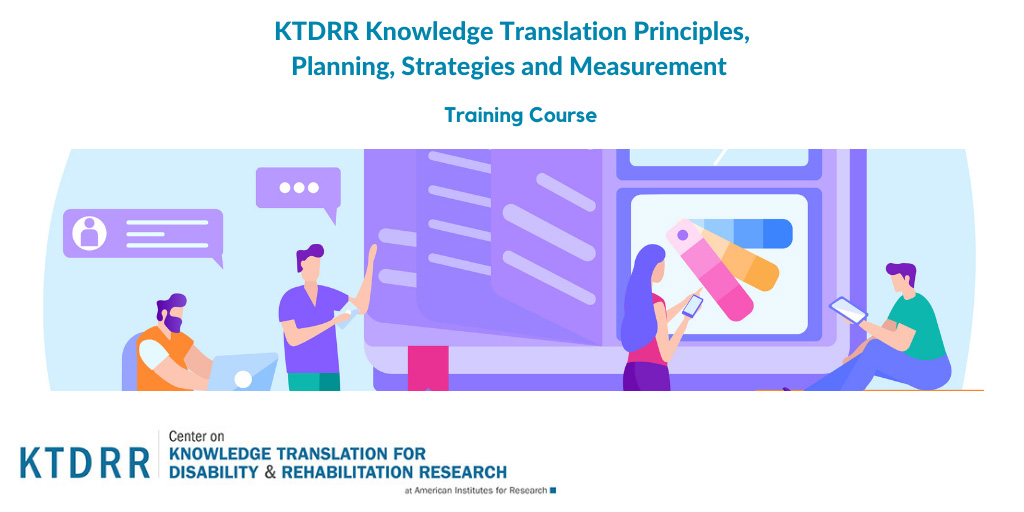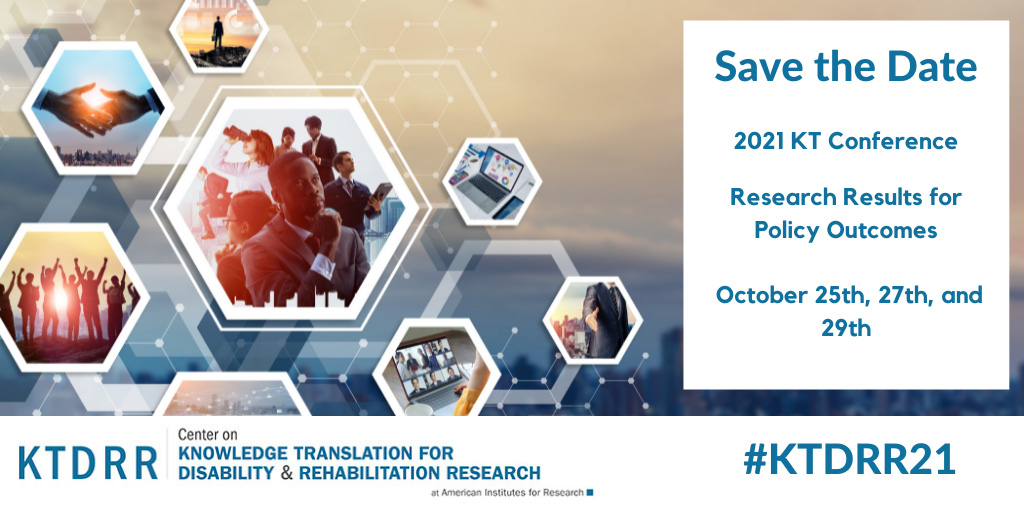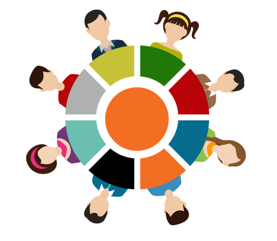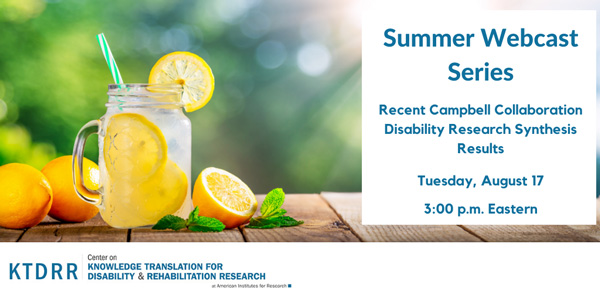KTDRR’s “Knowledge Translation Principles, Planning, Strategies and Measurement”
Training Course

The Center on KTDRR offers a comprehensive, five-part online training course on relevant KT topics to NIDILRR grantees. The learn-at-your-own-pace modules house curated resources that cover how to promote the use of findings and products. Content includes information ranging from a project’s planning phases through measuring its impact. The modules cover the following topics:
- KT Basics and Plans
- The “Knowledge” of KT
- Identifying Stakeholder Needs
- Applying KT From Proposals to Reality
- Monitoring and Evaluating KT
The course is free and open to all NIDILRR grantees and other interested members of the public.
Register now to receive information about how to log in
Save the Date! #KTDRR21:
Virtual Knowledge Translation Conference:
Research Results for Policy Outcomes
Mark your calendars—KTDRR's free, virtual conference will take place across three afternoons during one week: 1:00–5:00 pm Eastern Time each day on October 25, 27, and 29, 2021.
The conference is designed to address key questions pertaining to any researchers or product developers interested in making a policy impact with their work:
- Why is it important to engage stakeholders early and what are good ways to do that?
- What are the best ways to share information with policymakers?
- What are examples of research-informed policy?
The conference also provides opportunities to network with other KT experts and researchers. Check out our line-up of speakers on the developing
agenda.
Register for the 2021 KT Conference

2021 NARRTC Annual Meeting and Conference
October 19-20, 2021
“Resourcefulness, Resilience and
Responsiveness: Disability and Rehabilitation Research Following
the Covid-19 Pandemic”

Plan to be there when NIDILRR grantees reunite at the 2021 NARRTC Annual Meeting and Conference, either at the Ritz-Carlton, Pentagon City
on October 19-20, 2021 or virtually. After postponing in 2020, NARRTC’s executive committee is making plans to network, talk with seasoned
colleagues and “new recruits,” share cutting edge research, and learn about the latest plans from NIDILRR staff. Save the date and keep
tuned to the NARRTC website for updates. Conference organizers will announce in early September if the conference will be virtual or face-to-face.
Save the Date: Pre-NARRTC Conference Workshops:
“Science Communication and Public Engagement”
and “Outreach to Policymakers”
October 18, 2021
Make plans now to attend one or both of the free pre-NARRTC conference workshops the Center on KTDRR has planned for Monday, October 18, 2021—the day before NARRTC begins—at the Ritz-Carlton, Pentagon City (Arlington, VA) or, if NARRTC chooses a virtual mode, virtually.
These workshops are designed for NIDILRR grantees and their registrations are prioritized. Attendance for each workshop is capped at 25 registrants.
Non-grantees will be accepted if space is available.
We will communicate with registrants about any need for hotel reservations on Sunday evening as the date approaches.
Email ktdrr@air.org to express interest and receive updates on registration.
We will send you a link to an online complete formal registration form in mid-September once we can confirm whether the events will be virtual or face-to-face.
Science Communication and Public Engagement
8:30 AM – 12:00 PM
Learn fundamentals from current science communication research and basic best practices for engaging with the public, presented by the American Association for the Advancement of Science (AAAS). Participants will develop individual plans that include a public engagement goal and ways to engage a relevant audience with tailored messages. Participants also brainstorm an engagement scenario and identify steps to put their plans into action.
Outreach to Policymakers
1:00 – 5:00 PM
Learn about (and practice!) which strategies are best for sharing research information with state and national policymakers from Mark Bayer of Bayer Strategic Consulting. Barbara Shumar of Management Concepts will introduce the workshop with a short presentation describing restrictions on lobbying pertinent to federal grantees.
Join KTDRR’s CoP-EDR to Examine
Best Strategies for your Research Synthesis Goal
KTDRR's Community of Practice on Evidence for Disability and Rehabilitation Research (CoP-EDR) is getting a reboot with a new facilitator, Dr. Tanya Horsley, from the Royal College of Physicians and Surgeons of Canada. She is Associate Director of Research at the Royal College with expertise in evidence synthesis approaches and reporting guideline development. KTDRR and the CoP have greatly appreciated the many years of skilled facilitation, leadership and productive scholarship from previous facilitator, Dr. Marcel Dijkers.
The CoP will participate in a three-part series on research synthesis and how to select the best method to answer research questions in specific contexts. The group will examine approaches to research and when to use systematic reviews, scoping reviews, and other strategies. Save the dates now to participate in these upcoming CoP activities.
- September 23 (2:00 – 3:30 PM ET)
- November 17 (2:00 – 3:30 PM ET)
- February 23, 2022 (2:00 – 3:30 PM ET)
In previous activity
A subgroup of KTDRR’s CoP-EDR, led by Marcel Dijkers, conducted two studies using the Appraisal of Guidelines for Research & Evaluation, version II (AGREE II) to evaluate the quality of rehabilitation clinical practice guidelines (CPGs). This research activity resulted from a discussion on the applicability of rehabilitation CPGs, focused on the ability of rehabilitation clinicians to use treatments with their clients that were recommended by a guideline.
One study focused on how applicability and five other AGREE factors affect two AGREE global judgments on a guideline, including its overall quality and whether it is recommended. The open access article is now available.
- Citation: Dijkers, M. P., Ward, I., Annaswamy, T., Dedrick, D., Hoffecker, L., & Millis, S. R. (2021). What determines the quality of rehabilitation clinical practice guidelines? An overview study. American Journal of Physical Medicine & Rehabilitation, 100(8), 790-797. doi: 10.1097/PHM.0000000000001645
A previous quantitative study summarized the results of all review papers in the literature that used the AGREE II measure to appraise rehabilitation guidelines and you can access the article freely.
- Citation: Dijkers, M. P., Ward, I., Annaswamy, T., Dedrick, D., Feldpausch, J., Moul, A., & Hoffecker, L. (2020). The quality of rehabilitation clinical practice guidelines: An overview study of AGREE II appraisals. Archives of Physical Medicine & Rehabilitation, 101(9), 1643-1655. doi: https://doi.org/10.1016/j.apmr.2020.03.022
The CoP-EDR focuses on the creation, evaluation and use of evidence and related tools and strategies.
If you would like to participate or get more information, please contact Joann Starks.
Sept. 14 Campbell Collaboration Webinar:
New Publication of Update of Systematic Reviews on
Autism and Employment Interventions
This webinar features a recently published update to previously published systematic reviews in the Disability Coordinating Group (DCG) of the Campbell Collaboration. Author Carlton Fong of Texas State University and DCG Editor briefly describes the updating process. The review updated two empty reviews of studies related to the employment of transition-aged youth and adults with autism, combining the two populations in the update. The webcast highlights why it is important to examine the emergence of new studies regularly, to stay abreast of the state of evidence on disability topics.
Visit Campbell 2021Webinars.
REGISTER here.
The Center on Knowledge Translation for Employment Research (KTER Center), when it was housed at the American Institutes for Research under the direction of KTDRR project director Murphy, with funding from the National Institute on Disability, Independent Living and Rehabilitation Research (NIDILRR), supported the review team’s work on the update. Additional funding came from the American Institutes for Research for review activities involving Campbell Collaboration staff and affiliates and production of the plain language summary.
The update,
its
protocol and plain language summary are freely available to the public.
- Citation: Fong, C.J., Taylor, J., Berdyyeva, A., McClelland, A., Murphy, K.M., & Westbrook, J.D. (2021). Interventions for improving employment outcomes for persons with autism spectrum disorders: A systematic review update. Campbell Systematic Reviews. doi: https://doi.org/10.1002/cl2.1185
|




